“By the end of 2025, the government should prepare and adopt a National Spatial Plan for Flooded Areas, determine the exact number of replacement buildings for affected households, resolve all compensation procedures within three months and ensure payments, simplify procedures for proving the use of advance payments, and ensure legal certainty for those affected,” read the recommendations to the Government of the Republic of Slovenia regarding the forgotten victims of the floods that happened in August 2023. The recommendations were presented at a press conference by MP Jožef Jelen of the Slovenian Democratic Party (Slovenska demokratska stranka – SDS).
On the 4th of September, 2025, the Slovenian Democratic Party – SDS held a press conference at which MP Jožef Jelen presented a request for an extraordinary session of the National Assembly of the Republic of Slovenia to be convened in relation to the elimination of the consequences of the floods and landslides of August 2023. The press conference took place at the National Assembly of the Republic of Slovenia in Ljubljana from 11:00 a.m. onwards.
The SDS party parliamentary group emphasised that two years after the catastrophic floods of August 2023, many families are still living in containers, with their relatives, or in unsafe houses. Reconstruction has stalled, bureaucracy is stifling, and the state has failed to provide people with safety and decent homes.
Two years on, Golob has still not remedied the consequences of the floods!
MP Jelen said: “The SDS party parliamentary group has decided to call an extraordinary session of the National Assembly on the topic of dealing with the aftermath of the floods and landslides of August 2023. More than two years have passed since then, but there are still many problems and uncertainties on the ground.” As he went on to recall, Robert Golob’s government promised the fastest recovery in the history of independent Slovenia, but in practice, the opposite has turned out to be true.
People are still living in containers, and their hardship is great!
Two years after the disaster in August 2023, the reconstruction work is still not complete. Many families remain in rented apartments, some are living with their relatives, and some are still living in containers. In MP Jelen’s opinion, these people are in great distress. Some are also living in homes that are intended for replacement construction. Jelen: “Two years after the floods, many families are still without proper living conditions or are uncertain about where their homes will even be built.”
Experts: The government is only dealing with the consequences, not investing in prevention!
According to Jelen, many experts have also warned that the government is mostly dealing with the consequences instead of investing systematically in prevention. He is referring in particular to the national spatial plan, which remains unimplemented. The latter would need to ensure flood protection (floodplains, dry water reservoirs to protect settlements along torrents, and protection of industrial zones).
He also recalled a different approach to the floods of 1990, which were not as extensive as those of 2023. He cited the example of a family in the Upper Savinja Valley who moved into a new home after only six months. On the other hand, relocation of the victims of the 2023 floods is taking an unreasonably long time, even several months (for example, in the municipality of Braslovče). After two years, not a single family there has been allocated land to start building.
The priority should be to ensure flood protection
He also finds the distribution of aid by lottery controversial. Jelen is convinced that the government has chosen the completely wrong approach to tackling this problem. Some people’s houses were completely destroyed, leaving them homeless. They should be the first to receive land, but now they are all in the same process. He also pointed out that there have been many storms in Slovenia recently (especially in the Primorska region), which is causing concern among local residents.
The government’s priority should be to ensure flood protection in sensitive areas. In this regard, the SDS party has prepared several recommendations for the Government of the Republic of Slovenia. First, they call on it to prepare and monitor the National Spatial Plan for Flooded Areas from August 2023 (retention basins, floodplains, etc.) by the end of 2025. This plan would enable strategic and long-term planning of interventions in the most affected areas (in particular, the protection of residential areas, industrial zones, and key infrastructure). At the same time, it would reduce vulnerability to possible future natural disasters.
The Irmančnik family with four children removed from the list for replacement construction!
The second recommendation is that the Slovenian government should determine the exact number of replacement buildings by the end of 2025, both for households remaining in the areas and for those who will have to leave the flood areas permanently due to safety reasons. According to Jelen’s data, the number is not yet known for certain – how many people or how many buildings are intended for replacement construction.
It is also likely that some additional families or houses will have to be relocated. He also recalled that some were on the lists for replacement construction but were later removed for unknown reasons. He specifically mentioned the Irmančnik family from the Upper Savinja Valley, who have four children. The water level in their building (including the basement) was 3.5 meters at the time of the floods. The entire lower floor and their living area were flooded. The family is now asking everyone to help them, and they have even created a website, which you can visit and donate at here: https://druzina-irmancnik.si/
Lots of complaints regarding the damage assessments
The third recommendation to the Government of the Republic of Slovenia is to resolve all comments and unresolved procedures regarding compensation within a maximum of three months and to ensure the payment of advance payments for the restoration of damaged homes, including to those who did not have a valid occupancy permit on the 31st of July, 2023, in order to prevent prolonged uncertainty among residents. According to MP Jelen, there were also several complaints made regarding the damage assessments. This resulted in differences in valuation. However, some people who sent objections have not received any response to date.

The fourth recommendation to the Government of the Republic of Slovenia reads as follows: “We call on the Government of the Republic of Slovenia to adopt measures within three months to simplify and legally regulate procedures relating to the verification of the use of advance payments made in accordance with the law.” When the damage was being assessed, people were already rushing to help each other, and there was a great sense of solidarity in Slovenia at the time. In the fall, people received advance payments for damage caused to their buildings (amounting to 20 percent) in several instalments. Some of those who received the money had already had construction and mechanical work (central heating, etc.) carried out.
Underhanded: The government changed the rules “mid-game”!
Some were also helped by companies and friends. And a few months later, after receiving the advance payments, they were informed that if anyone did not want the funds (received in advance payments), they could return them. After a few months, they received a request to submit invoices with proof of payment for the amount of these funds. And that’s when the problem arose, because some of them had not used the funds for the stated purposes, as the construction and mechanical work had already been completed beforehand, and they had purchased various household appliances and so on, so that they could live normally in their apartments. The authorities had therefore changed the rules “mid-game.”
Domen Mezeg


